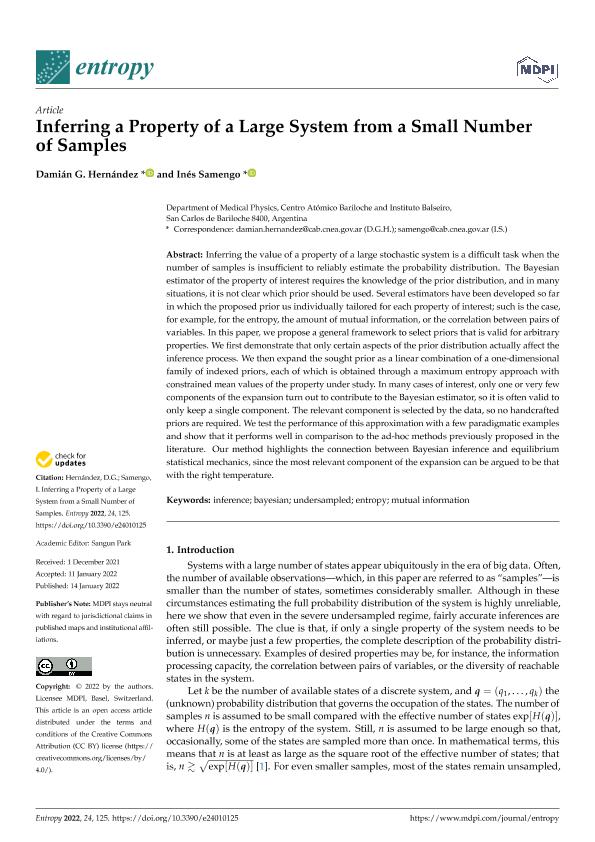Artículo
Inferring a Property of a Large System from a Small Number of Samples
Fecha de publicación:
01/2022
Editorial:
Molecular Diversity Preservation International
Revista:
Entropy
ISSN:
1099-4300
Idioma:
Inglés
Tipo de recurso:
Artículo publicado
Clasificación temática:
Resumen
Inferring the value of a property of a large stochastic system is a difficult task when the number of samples is insufficient to reliably estimate the probability distribution. The Bayesian estimator of the property of interest requires the knowledge of the prior distribution, and in many situations, it is not clear which prior should be used. Several estimators have been developed so far in which the proposed prior us individually tailored for each property of interest; such is the case, for example, for the entropy, the amount of mutual information, or the correlation between pairs of variables. In this paper, we propose a general framework to select priors that is valid for arbitrary properties. We first demonstrate that only certain aspects of the prior distribution actually affect the inference process. We then expand the sought prior as a linear combination of a one-dimensional family of indexed priors, each of which is obtained through a maximum entropy approach with constrained mean values of the property under study. In many cases of interest, only one or very few components of the expansion turn out to contribute to the Bayesian estimator, so it is often valid to only keep a single component. The relevant component is selected by the data, so no handcrafted priors are required. We test the performance of this approximation with a few paradigmatic examples and show that it performs well in comparison to the ad-hoc methods previously proposed in the literature. Our method highlights the connection between Bayesian inference and equilibrium statistical mechanics, since the most relevant component of the expansion can be argued to be that with the right temperature.
Palabras clave:
BAYESIAN
,
ENTROPY
,
INFERENCE
,
MUTUAL INFORMATION
,
UNDERSAMPLED
Archivos asociados
Licencia
Identificadores
Colecciones
Articulos(CCT - PATAGONIA NORTE)
Articulos de CTRO.CIENTIFICO TECNOL.CONICET - PATAGONIA NORTE
Articulos de CTRO.CIENTIFICO TECNOL.CONICET - PATAGONIA NORTE
Citación
Hernández Lahme, Damián Gabriel; Samengo, Ines; Inferring a Property of a Large System from a Small Number of Samples; Molecular Diversity Preservation International; Entropy; 24; 1; 1-2022; 1-17
Compartir
Altmétricas




